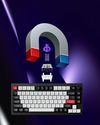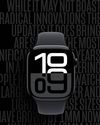Or how your brain needs your eyes to help trick your ears into hearing what’s not there.

In the past few months, I’ve experienced two different audio technology demos that have given me more insight into audio processing than I have had in my entire career. And I’ve come to the conclusion that you really have to “see” audio in order to believe in the experience that you’re hearing.
Of course, this concept isn’t really new. Think of blind taste testing, or the popular mystery box game where people stick their hands into a box and try to guess what they’re touching. As humans, we need visual confirmation of the input from our other senses in order to process it.
I knew this of course, but I misjudged the extent of the difference that sight brings to the table. This is why it’s so hard to appreciate audio technologies such as surround, binaural, 3D or physically-based sound. You can read about it and understand what is happening, but you may not always be able to put a finger on what you’re hearing.
Many surround sound systems try to mimic multiple audio sources to trick you, commonly called HRTF processing, or Head Related Transfer Function. Object-based surround sound like DTS:X and Dolby Atmos take the concept further by treating sound like an object that can be moved around in a 3D space, so you don’t just hear sounds front, or left, or back, but all around around you.
هذه القصة مأخوذة من طبعة December 2018 من HWM Singapore.
ابدأ النسخة التجريبية المجانية من Magzter GOLD لمدة 7 أيام للوصول إلى آلاف القصص المتميزة المنسقة وأكثر من 9,000 مجلة وصحيفة.
بالفعل مشترك ? تسجيل الدخول
هذه القصة مأخوذة من طبعة December 2018 من HWM Singapore.
ابدأ النسخة التجريبية المجانية من Magzter GOLD لمدة 7 أيام للوصول إلى آلاف القصص المتميزة المنسقة وأكثر من 9,000 مجلة وصحيفة.
بالفعل مشترك? تسجيل الدخول

ON THE CUTTING EDGE
The Keychron Q1 HE might look like just another addition to the already packed mechanical keyboard market, but there's something a bit special about this one.

About Singaporeans, iPhones, and the Find X8 Pro's return:
OPPO's tell-all interview with its top executives

Best eSIM Roaming
Data Plans For Trips To China, Japan, South Korea, And Taiwan

Everything You Need To Know About OPPO ColorOS 15
REINVENTING COLOROS 15 For many Android-based phone brands, a reskinned operating system is just a reinterpretation of their design choices and brand image. Sometimes, proprietary features make things more convenient than stock Android, but the rest is a repackaging.

5 Steps To Ensure Your Computer Security
FOR MANY YEARS, HAVING ANTIVIRUS INSTALLED on your PC was all that was needed to keep you safe from cyberattackers. And where Macs used to be the \"safe\" alternative is unfortunately no longer true.

MEANINGFUL REFINEMENT
Now I’ve been reviewing smartwatches and activity trackers for a long time, and the Watch GT 5 Pro is the first watch to actually get attention from my wife, complimenting its looks in the way of a classy wristwatch.

BIGGER DISPLAY, BUT WHAT ELSE?
My initial impression of the Pixel Watch 2 was that it felt like a round Fitbit Sense 2 running Wear OS. The tradeoff was losing iOS compatibility while still facing Fitbit’s paywall for advanced app features.

AMBITIOUS.FEATURE-RICH.OVERLOADED
The Amazfit Balance is designed to compete with Fitbit, Garmin, and Huawei devices, while maintaining independence by being compatible with both iOS and Android. Priced at $352, and often discounted below $300, it's a value-packed option.

It's Upgrade Time
As the tenth anniversary of the Apple Watch approached, rumours about a revolutionary device with a dramatic design change swirled-the Apple Watch X. But as it turns out, we got the Apple Watch Series 10 instead.

Ryzen AI Enters The Fray
This review covers the flagship processor in the lineup, the Ryzen AI 9 HX 370, which features a powerful 12-core, 24-thread configuration, 36MB of cache, and Radeon 890M graphics.